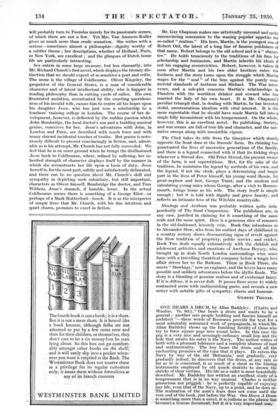ONE HEARS A DRUM, by Allan Baddeley. (Chatto and Windt's.
7s. fid.)." One hears 'a druin and wants to be a general ; another sees people building and fancies himself an architect "—these words of Rousseau provide the text for a most admirably restrained work of propaganda, in which Mr. Allan Baddeley shows up the fumbling futility of those who try to force square pegs into round holes. In this case the peg is a very nice and seemingly-ordinary small boy and the hole that awaits his entry is the Navy. The author writes of both with a pleasant tolerance and a complete absence of rant and sentimentality. The boy hears the drum and all the enchanting promises of the tune that it plays. He enters the Navy by way of the old 'Britannia,' and gradually, very gradually indeed, he discovers that the drum, at any rate so far as he is concerned, is as much of a cheat as the blaring instruments employed by old quack dentists to drown the shrieks of their victims. His life as a cadet is most beautifully described. Mr. Baddeley has written an excellent study of a temperament that is in no way unusual. Charles is neither precocious nor priggish : he is perfectly capable of 'enjoying any life, even that of the Navy, up to a point, and he does so. The realization of the aunt's fears does not come until the very end of the book, just before the War. One Hears A Drum is something more than a novel, it is.(odious as the_phrase has become) a human document, -but it is a very-important one.






































 Previous page
Previous page